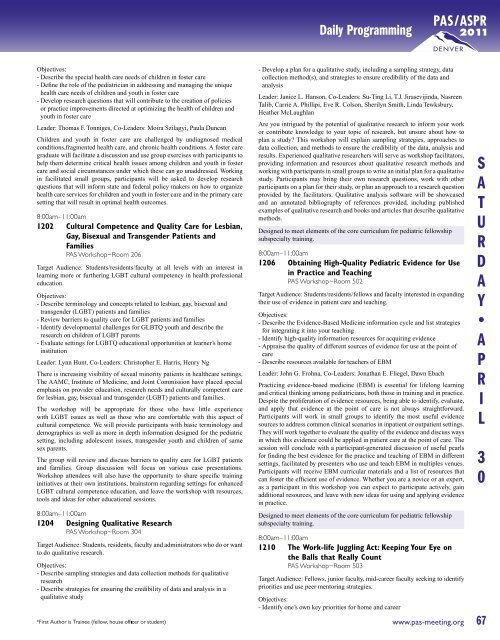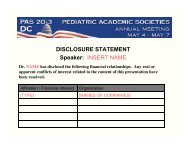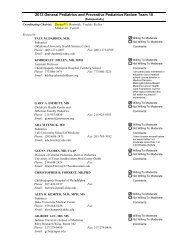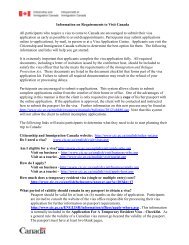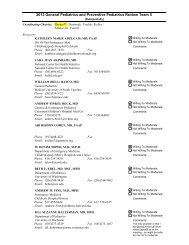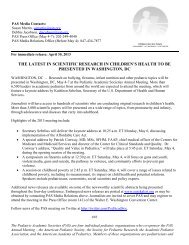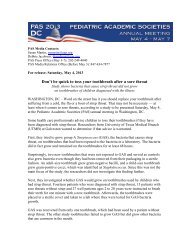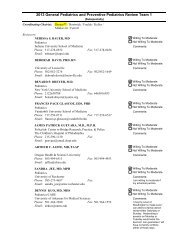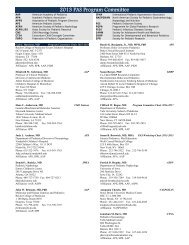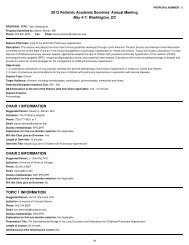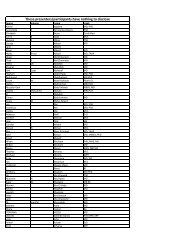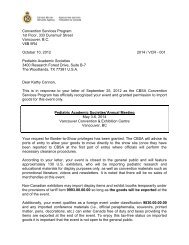F R I D A Y • A P R I L - Pediatric Academic Societies
F R I D A Y • A P R I L - Pediatric Academic Societies
F R I D A Y • A P R I L - Pediatric Academic Societies
You also want an ePaper? Increase the reach of your titles
YUMPU automatically turns print PDFs into web optimized ePapers that Google loves.
Objectives:<br />
- Describe the special health care needs of children in foster care<br />
- Define the role of the pediatrician in addressing and managing the unique<br />
health care needs of children and youth in foster care<br />
- Develop research questions that will contribute to the creation of policies<br />
or practice improvements directed at optimizing the health of children and<br />
youth in foster care<br />
Leader: Thomas F. Tonniges, Co-Leaders: Moira Szilagyi, Paula Duncan<br />
Children and youth in foster care are challenged by undiagnosed medical<br />
conditions,fragmented health care, and chronic health conditions. A foster care<br />
graduate will facilitate a discussion and use group exercises with participants to<br />
help them determine critical health issues among children and youth in foster<br />
care and social circumstances under which these can go unaddressed. Working<br />
in facilitated small groups, participants will be asked to develop research<br />
questions that will inform state and federal policy makers on how to organize<br />
health care services for children and youth in foster care and in the primary care<br />
setting that will result in optimal health outcomes.<br />
8:00am–11:00am<br />
1202 Cultural Competence and Quality Care for Lesbian,<br />
Gay, Bisexual and Transgender Patients and<br />
Families<br />
PAS Workshop~Room 206<br />
Target Audience: Students/residents/faculty at all levels with an interest in<br />
learning more or furthering LGBT cultural competency in health professional<br />
education.<br />
Objectives:<br />
- Describe terminology and concepts related to lesbian, gay, bisexual and<br />
transgender (LGBT) patients and families<br />
- Review barriers to quality care for LGBT patients and families<br />
- Identify developmental challenges for GLBTQ youth and describe the<br />
research on children of LGBT parents<br />
- Evaluate settings for LGBTQ educational opportunities at learner’s home<br />
institution<br />
Leader: Lynn Hunt, Co-Leaders: Christopher E. Harris, Henry Ng<br />
There is increasing visibility of sexual minority patients in healthcare settings.<br />
The AAMC, Institute of Medicine, and Joint Commission have placed special<br />
emphasis on provider education, research needs and culturally competent care<br />
for lesbian, gay, bisexual and transgender (LGBT) patients and families.<br />
The workshop will be appropriate for those who have little experience<br />
with LGBT issues as well as those who are comfortable with this aspect of<br />
cultural competence. We will provide participants with basic terminology and<br />
demographics as well as more in depth information designed for the pediatric<br />
setting, including adolescent issues, transgender youth and children of same<br />
sex parents.<br />
The group will review and discuss barriers to quality care for LGBT patients<br />
and families. Group discussion will focus on various case presentations.<br />
Workshop attendees will also have the opportunity to share specific training<br />
initiatives at their own institutions, brainstorm regarding settings for enhanced<br />
LGBT cultural competence education, and leave the workshop with resources,<br />
tools and ideas for other educational sessions.<br />
8:00am–11:00am<br />
1204 Designing Qualitative Research<br />
PAS Workshop~Room 304<br />
Target Audience: Students, residents, faculty and administrators who do or want<br />
to do qualitative research.<br />
Objectives:<br />
- Describe sampling strategies and data collection methods for qualitative<br />
research<br />
- Describe strategies for ensuring the credibility of data and analysis in a<br />
qualitative study<br />
*First Author is Trainee (fellow, house officer or student)<br />
Daily Programming<br />
- Develop a plan for a qualitative study, including a sampling strategy, data<br />
collection method(s), and strategies to ensure credibility of the data and<br />
analysis<br />
Leader: Janice L. Hanson, Co-Leaders: Su-Ting Li, T.J. Jirasevijinda, Nasreen<br />
Talib, Carrie A. Phillipi, Eve R. Colson, Sherilyn Smith, Linda Tewksbury,<br />
Heather McLaughlan<br />
Are you intrigued by the potential of qualitative research to inform your work<br />
or contribute knowledge to your topic of research, but unsure about how to<br />
plan a study? This workshop will explain sampling strategies, approaches to<br />
data collection, and methods to ensure the credibility of the data, analysis and<br />
results. Experienced qualitative researchers will serve as workshop facilitators,<br />
providing information and resources about qualitative research methods and<br />
working with participants in small groups to write an initial plan for a qualitative<br />
study. Participants may bring their own research questions, work with other<br />
participants on a plan for their study, or plan an approach to a research question<br />
provided by the facilitators. Qualitative analysis software will be showcased<br />
and an annotated bibliography of references provided, including published<br />
examples of qualitative research and books and articles that describe qualitative<br />
methods.<br />
Designed to meet elements of the core curriculum for pediatric fellowship<br />
subspecialty training.<br />
8:00am–11:00am<br />
1206 Obtaining High-Quality <strong>Pediatric</strong> Evidence for Use<br />
in Practice and Teaching<br />
PAS Workshop~Room 502<br />
Target Audience: Students/residents/fellows and faculty interested in expanding<br />
their use of evidence in patient care and teaching.<br />
Objectives:<br />
- Describe the Evidence-Based Medicine information cycle and list strategies<br />
for integrating it into your teaching<br />
- Identify high-quality information resources for acquiring evidence<br />
- Appraise the quality of different sources of evidence for use at the point of<br />
care<br />
- Describe resources available for teachers of EBM<br />
Leader: John G. Frohna, Co-Leaders: Jonathan E. Fliegel, Dawn Ebach<br />
Practicing evidence-based medicine (EBM) is essential for lifelong learning<br />
and critical thinking among pediatricians, both those in training and in practice.<br />
Despite the proliferation of evidence resources, being able to identify, evaluate,<br />
and apply that evidence at the point of care is not always straightforward.<br />
Participants will work in small groups to identify the most useful evidence<br />
sources to address common clinical scenarios in inpatient or outpatient settings.<br />
They will work together to evaluate the quality of the evidence and discuss ways<br />
in which this evidence could be applied in patient care at the point of care. The<br />
session will conclude with a participant-generated discussion of useful pearls<br />
for finding the best evidence for the practice and teaching of EBM in different<br />
settings, facilitated by presenters who use and teach EBM in multiples venues.<br />
Participants will receive EBM curricular materials and a list of resources that<br />
can foster the efficient use of evidence. Whether you are a novice or an expert,<br />
as a participant in this workshop you can expect to participate actively, gain<br />
additional resources, and leave with new ideas for using and applying evidence<br />
in practice.<br />
Designed to meet elements of the core curriculum for pediatric fellowship<br />
subspecialty training.<br />
8:00am–11:00am<br />
1210 The Work-life Juggling Act: Keeping Your Eye on<br />
the Balls that Really Count<br />
PAS Workshop~Room 503<br />
Target Audience: Fellows, junior faculty, mid-career faculty seeking to identify<br />
priorities and use peer mentoring strategies.<br />
Objectives:<br />
- Identify one’s own key priorities for home and career<br />
www.pas-meeting.org<br />
S<br />
A<br />
T<br />
U<br />
R<br />
D<br />
A<br />
Y<br />
<strong>•</strong><br />
A<br />
P<br />
R<br />
I<br />
L<br />
0


